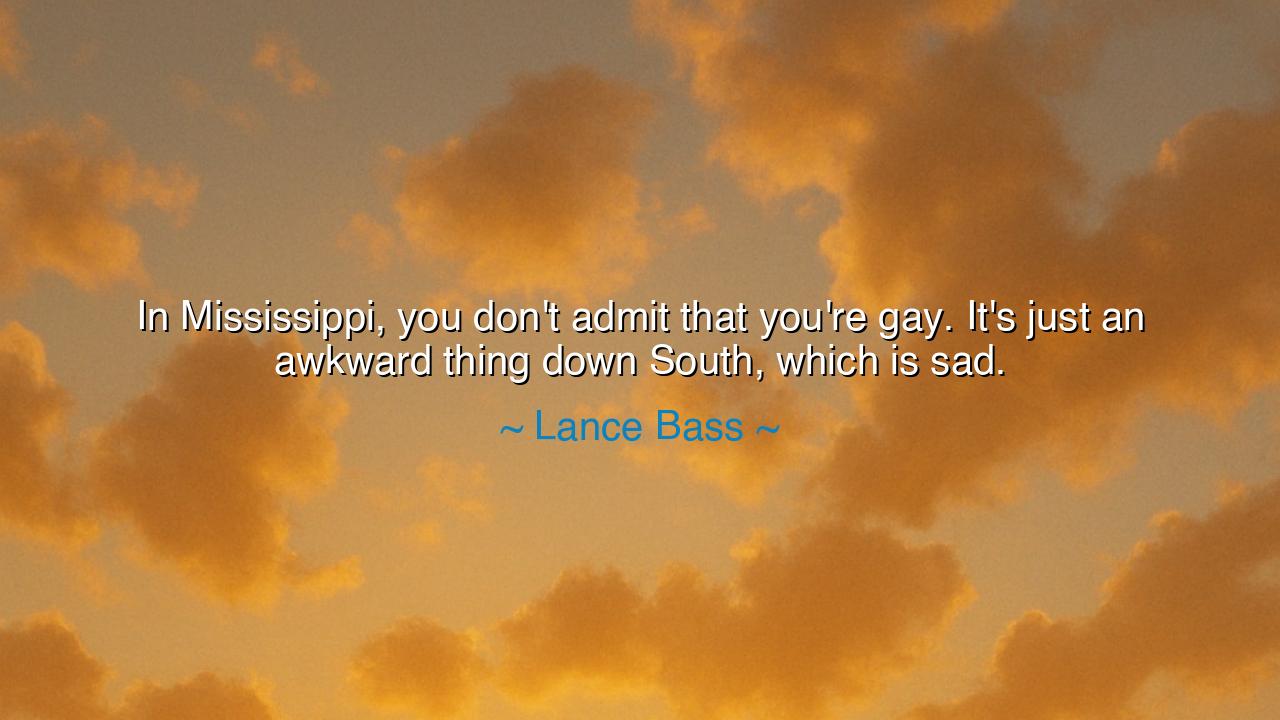
In Mississippi, you don't admit that you're gay. It's just an
In Mississippi, you don't admit that you're gay. It's just an awkward thing down South, which is sad.






The words of Lance Bass, “In Mississippi, you don’t admit that you’re gay. It’s just an awkward thing down South, which is sad,” rise from a place both personal and universal—a lament for the burdens of truth in a world not yet ready to hear it. Beneath their quiet tone lies the ancient sorrow of those who have been forced to hide their light, not because of shame, but because of the blindness of others. Bass, a son of the American South and a man who came to fame in the public eye, speaks not merely of one place or one identity, but of a timeless struggle—the conflict between authenticity and acceptance, between the courage to be and the fear of rejection.
In this reflection, Mississippi becomes more than a location; it becomes a symbol of any society bound by tradition so tightly that it fears difference. The “awkwardness” Bass describes is the tension of a culture where love is measured by conformity, and truth must be spoken in whispers. He does not speak with anger, but with sorrow, for such environments do not only wound the hearts of those who must hide—they also diminish the collective soul of the community. When truth cannot breathe, kindness itself suffocates. His words remind us that silence, even when polite, can be a cruel form of exile.
This tension between the individual and the tribe is as old as civilization. The philosopher Socrates, though not condemned for love but for thought, suffered the same fate: he dared to live and speak differently in a city that prized conformity. His death was not merely the punishment of a man, but the warning of a culture fearful of self-examination. Likewise, the South that Bass describes, with all its beauty and contradictions, mirrors this timeless pattern—a place that cherishes honor and family, yet fears the honesty that would expand both. In such a world, those who live authentically are not rebels—they are the keepers of truth, paying the price for others’ comfort.
Bass’s lament also carries the ache of lost time. For every soul forced to conceal who they are, there are years—sometimes lifetimes—spent in performance rather than presence. To “not admit” one’s identity is to carry an invisible burden, to walk through life as a ghost of one’s own making. The ancients might have called this a tragedy of the spirit: a hero who must disguise himself to survive among his own people. Yet in this quiet suffering, there is also dignity. For to endure without surrendering one’s inner truth is itself a form of heroism—a resistance that prepares the way for future freedom.
There are echoes of this story in the life of the mathematician Alan Turing, who gave the modern world the key to victory in war and the birth of computation, yet was condemned for his love. Like Bass, he lived in a time and culture that deemed honesty “awkward” and difference “shameful.” His suffering stands as a testament to humanity’s paradox: that those who offer the most light are often cast into shadow by the ignorance of their age. But history, in time, redeems its truth-tellers. The world that once silenced them eventually builds monuments to their courage.
And so, Bass’s words are not only sorrowful—they are prophetic. They reveal the distance still to be traveled between tolerance and acceptance, between mere politeness and genuine understanding. His sadness is not only for the South, but for all hearts that have yet to learn that diversity is not a threat to tradition, but its renewal. Where there is discomfort, there is potential; where there is “awkwardness,” there is opportunity for growth. For the culture that dares to face its own discomfort becomes stronger, wiser, and more humane.
So let this teaching be passed down: to know truth and hide it is sorrow; to know truth and speak it is liberation. Every society must decide whether it will choose comfort or courage, silence or honesty. As Lance Bass reminds us, the sadness of the South—or of any place bound by fear—can only be healed when people dare to live openly, and when communities choose to listen without judgment. For in the end, the heart’s truth is not something to be concealed—it is the foundation of love itself. And where love is allowed to speak, awkwardness gives way to grace, and sorrow transforms into light.






AAdministratorAdministrator
Welcome, honored guests. Please leave a comment, we will respond soon